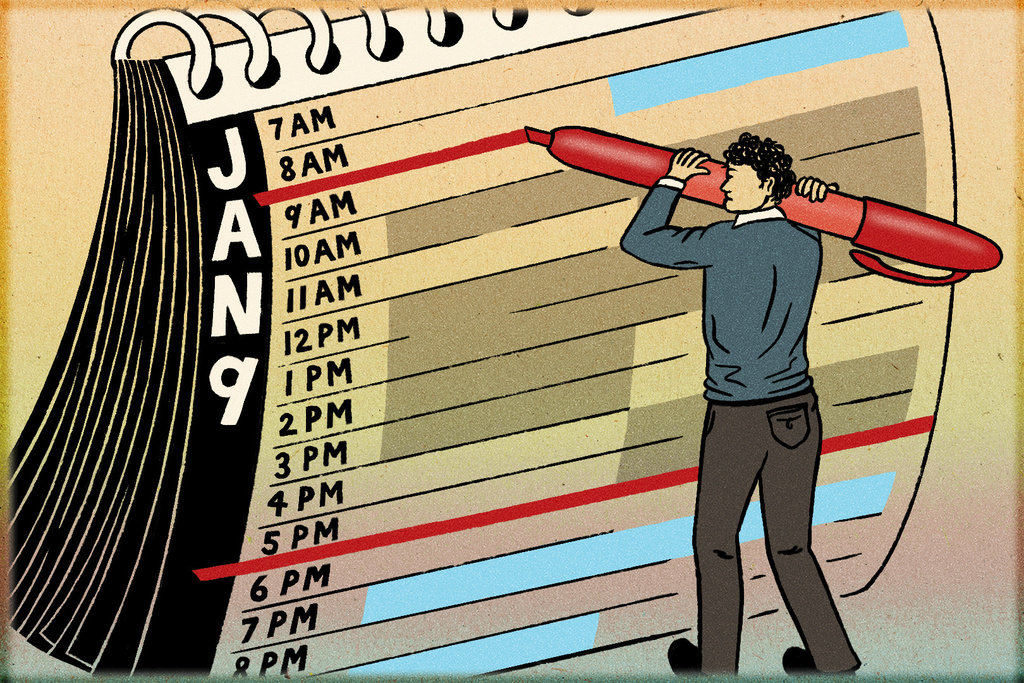View time: 1 min 38
Level : Advanced
View time: 1 min 38
Level : Advanced
Read time : 3 mins
Level : Advanced

By CATHY BUSSEWITZ Associated Press
NEW YORK (AP) — When Justin Stewart started his career, he juggled several jobs to make ends meet. He poured himself into his full-time role as a news show production assistant from 3 a.m. until noon. Then he rushed to the airport where he rented cars or to the big box stores where he pulled retail shifts.
Sometimes, he slept in his car between jobs. Then he was hospitalized for exhaustion and a staph infection.
“While people around me praised my hustle, I eventually paid the price,” Stewart said. “The doctor looked at me and said, ‘I don’t know what lifestyle you’re living, but you’re too young to be this stressed. You’re going to have to quit something.'”
So Stewart, now 36, began setting boundaries. He gave up the side jobs, deciding he could survive without extra income. If people from the news show texted him after-hours, he let them know he was off-duty and where else to call. Continue reading
Read time : 2 mins
Level : Intermediate

By Michael Dinich | Wealth of Geeks undefined
Too much of a good thing? Streaming service subscribers report that content overload and hidden fees are leading to frustration and subscription fatigue.
In fact, the new survey of 2,000 American streaming service subscribers revealed that the average person spends 110 hours per year scrolling through streaming services, struggling to find something worth watching — a stark reminder of the “too much content, too little time” dilemma.
Commissioned by UserTesting and conducted by Talker Research, the study revealed one in five believe it’s harder to find something to watch today than it was 10 years ago. According to them, the underlying cause comes from being overwhelmed by too much content.
Many struggled with having larger content libraries (41%) and feeling like there’s too much original content being produced (26%). Continue reading
View time : 1 min 47
Level : Intermediate
View time: 1 min 45
Level : Advanced
Read time : 3 mins
Level : Advanced

By HEATHER HOLLINGSWORTH Associated Press
For Makenzie Gilkison, spelling is such a struggle that a word like rhinoceros might come out as “rineanswsaurs” or sarcastic as “srkastik.”
The 14-year-old from suburban Indianapolis can sound out words, but her dyslexia makes the process so draining that she often struggles with comprehension. “I just assumed I was stupid,” she recalled of her early grade school years.
But assistive technology powered by artificial intelligence has helped her keep up with classmates. Last year, Makenzie was named to the National Junior Honor Society. She credits a customized AI-powered chatbot, a word prediction program and other tools that can read for her.
“I would have just probably given up if I didn’t have them,” she said. Continue reading
Read time : 2 mins
Level : Intermediate

By Chhavi Agarwal | Wealth of Geeks undefined
As rampant layoffs across industries concern many American workers, a recent ResumeTemplates.com survey reveals another potentially significant workforce shift. More than half (56%) of survey respondents admit they’re already searching for a new job or plan to start hunting in the coming year.
Perhaps even more striking, 1 in 3 job seekers expressed willingness to quit their current positions, even without another job lined up.
These findings highlight a growing trend of career reassessment as workers look for new opportunities amid a challenging and changing job market. Continue reading
View time : 1 min 27
Level : Intermediate
View time: 1 min 08
Level : Advanced
Read time : 3 mins
Level : Advanced

By MARK KENNEDY and LINLEY SANDERS Associated Press
NEW YORK (AP) — If you’re planning on ringing in the new year quietly at home, you’re not alone.
A majority of U.S adults intend to celebrate New Year’s Eve at home, according to a new poll by The Associated Press-NORC Center for Public Affairs Research.
“As I’ve gotten older over the last few years, it’s like if I don’t make it to midnight, it’s not a big deal, you know?” says Carla Woods, 70, from Vinton, Iowa.
Nearly 2 in 10 will be celebrating at a friend or family member’s home, and just 5% plan to go out to celebrate at a bar, restaurant or organized event, the poll found.
But many U.S. adults will celebrate the new year in a different way — by making a resolution. More than half say they’ll make at least one resolution for 2025. Continue reading
